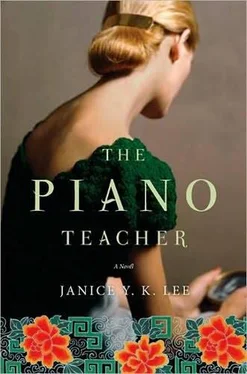The line is tense as everyone waits. When it comes to their turn, the guard hands them a soft brown paper package wrapped in twine. They retire to their room in high excitement to open it.
“Feels like Christmas! ”
Will is finding the package hard to open. His fingernails are as soft as the paper. Finally he is able to undo the knots. They store the string away carefully-nothing is ever discarded these days-and gaze in grateful wonder at what is inside.
“It looks like a scientist packed this! ” Johnnie exclaims.
There are six chocolate bars, slightly moldy, but no matter, a large tin of McVities biscuits, coffee, tea, a good amount of sugar and powdered milk, and some knitted socks and a muffler. These ordinary items look as valuable as gold coins. There is also a bonus: a tiny chess set and, hidden discreetly within, a small piece of paper with rounded, girlish writing.
Johnnie reads it aloud, the muffler tied comically around his head like a turban:
“ ‘Our thoughts and prayers are with you. Keep your spirits up and good WILL prevail. My name is Sharon and I would love to correspond with you if you are able. I have blond hair, blue eyes, and, people say, a ready smile.’ ”
“Lovely penmanship,” says Johnnie, sniffing the paper. “Nice sense of balance, just enough so that the censors wouldn’t get her, yet still unambiguous. And look, here she’s written her address.”
“Delightful,” says Will drily. “ Sharon from Sussex, our savior.”
“I’m going to look Sharon up when I get home,” says Johnnie, tucking her note into his shirt pocket. “She seems like the kind of girl I should settle down with.”
“What about me? ”
“You already have a sweetheart. Don’t be piggy. Sharon ’s mine.” Johnnie shoves an entire bar of chocolate into his mouth.
“Do you know how to play chess?” Will begins to assemble the pieces.
“Is there any money in it?”
“No, but there is your mental well-being to consider. Our brains are beginning to rot in here.” Johnnie is his first friend, Will realizes. He hasn’t made any in the colony, didn’t have to, with Trudy. It feels good.
The next morning, Will sees the little boy from the hotel, Tobias, squatting alone outside the bathroom with his airplane.
“Did you enjoy your chocolate?” he asks.
There’s no answer.
“Where’s your mother?”
The boy just stares at him, his face pale, his fair hair lanky and matted. He works the ragged airplane around his hand, smoothly. It’s become a part of his anatomy.
“Is your mother not feeling well?”
The boy starts to cry.
“It’s all right. If she’s in there she’ll be out in a minute.”
Just then the door bangs open with a crash. Fujimoto steps out, buttoning his trousers. Will steps back instinctively but the man ignores him and walks away.
“I guess she’s not. Do you want to come find your mother with me?” Will extends a hand. The boy looks down at the floor and shakes his head vigorously.
“Listen,” and then the door opens again and Mary Cox comes out. He blinks. Her hand goes to her mouth when she sees Will. She turns away.
“Come on, darling,” she says to Tobias. “Let’s go get supper.” She brushes past Will and scuttles down the hall, dragging the child with her. Then she turns around and stares at him, her face hardening into something unapologetic, fierce.
So that’s how it goes, he thinks. That’s the beginning of how it all changes. We become survivors or not.
He tells Johnnie about Mary Cox.
“That was only a matter of time, though, wasn’t it? Market economy springs up everywhere. People figure out what they have to sell and what they want to buy.”
“Bloodless of you.”
“This war has been bloody enough without me getting all sentimental. And you too, old man. Don’t get all soft on us. It won’t do anyone any good.”
But Will is unable to get the image of Tobias waiting outside the bathroom out of his mind.
At dinnertime, they walk outside to find a scandal of another sort has erupted. Regina Arbogast has accused one of the mothers of stealing chocolate and biscuits from her Red Cross package and is demanding a trial. Hugh Trotter is trying to explain to her that the legal system they have set up is meant for more serious matters, such as mistreatment by the guards, or stealing from the communal kitchen, but she refuses to listen.
“You and your filthy children are eating more than their share! They should have been sent home to England months ago. They shouldn’t be here at all, taking food from others! They shouldn’t be here at all.”
The woman looks ambushed.
“ Regina,” she starts. “I didn’t take your food but you have a family too. How can you talk about children like that?”
“My children were raised right, not like yours. They’re like animals! And mine are in England where they belong! ”
“But yours are grown. I couldn’t send Sandy and Margaret away. They’re too young to be separated from their mother.”
“You should have gone with them!”
“You shouldn’t be here either, then,” the mother says finally. “It should be just the men. All the women and children are supposed to be gone. So you’re draining us of resources as well.”
“What rubbish!” Regina looks as if she is ready to strike the woman. “Your family has always taken advantage of situations. Reggie’s done business with your husband and always said he was a common man, a slippery sort, always getting around things.”
“Just a minute there,” Hugh Trotter interjects. He has wisely tried to keep on the sidelines, but this venture into the personal cannot be ignored. “Let’s keep to the matter at hand.”
“The matter at hand, Hugh,” Regina says slowly, as if he is mentally challenged, “is that this woman has taken some of my personal belongings and you are refusing to treat it in a serious matter.”
“For God’s sake, Regina.” Hugh throws up his hands. “We are bloody refugees here. None of us owns anything at the moment. They were packages for war refugees. Can’t you be a little more generous? We’re all in the same boat.”
“Don’t you dare swear at me!” Her voice goes high-pitched. “We are not in the same boat! I will never be in the same boat as that woman. She is something else quite entirely.”
The Americans are watching from afar, aghast. Sometimes Will feels traitorous, the way he admires the Americans, or not really admires them but feels like he is more one of them. Despite her professed love for Americans, Trudy never really liked them-Will thinks they’re too democratic for her tastes. She likes a little delineation between the classes. Here, though, their system is so clearly superior to anything any other group has. Even in these surroundings, they radiate plenty and wealth. Bill Schott is autocratic, to be sure, but he gets things done efficiently and quickly and has managed to acquire a great many things for his people, mostly at his own expense, it is surmised, but still. Those in the British camp who have the wherewithal to help others rarely do, preferring to hoard what they have for fear of darker days ahead. The Americans have a system for sharing what they do have, although because they are fewer and not so strapped, it must be easier.
Regina Arbogast stomps her foot like a child and cries out.
“This is just impossible! There are no standards at all! Nothing is to be done here. I’ll have to take matters into my own hands.” She walks off in a huff.
“A little diversion is always welcome,” observes Johnnie. “She’s quite a pistol, that one. We’re going to have to watch her.”
Rice, rice, rice. After some two months, it’s all anyone talks about. They have become absurdly creative with it-grinding it for flour, boiling it for gruel and water, trying to stretch it out as much as possible. Food is the main topic. For one glorious week, there is pork on the ration lorry every day, until the story gets out that a pig farm had been shut down for disease and they are being fed the carcasses. Still, most just boil it well and continue to eat it. Beggars can’t be choosers.
Читать дальше












